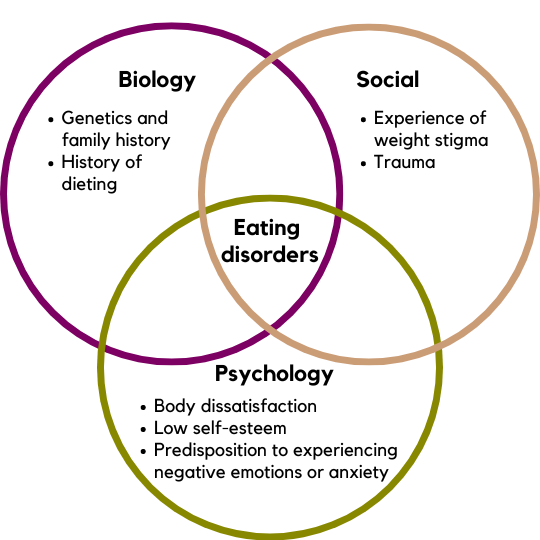
Health is greatly influenced by various factors outside the domain of the health sector, including social, economical, and political forces. These forces largely shape the circumstances in which people grow, live, work, and age – creating systems that have resulted in health inequities.
Health promotion is about equipping people with knowledge about their health and its determinants. It is a holistic approach to empower individuals; involves collaborating with communities, health providers, and other stakeholders; and promotes intersectional action to develop sustainable health systems and public policies.
On this page, you'll find information on:
Eating disorders are complex, with biological, psychological, and social influences. Some potential risk factors include:

Given these factors, eating disorders preventative strategies and perspectives must go beyond population-based (selective prevention) and individual-based interventions (targeted prevention), to acknowledge environmental risk factors, particularly on a macro-level (universal prevention). This includes challenging the entrenched myths about eating disorders, such as the mistaken beliefs that eating disorders affect only a small subset of females, that a focus on eating disorders will distract from obesity prevention and other comorbid health risks, and that the practices of the diet-products and related industries are unrelated to public health (Austin, 2012).
Learn more about the different types of eating disorders under Eating Disorders & Treatment.
You can browse our webinars archive to view past sessions organized for public distribution, as well as register for upcoming sessions. We address various topics, some of which include diet culture and weight stigma, eating disorder and comorbidities, skills and strategies for folks directly affected, tips for educators, and treatment approaches.
Our media page houses an archive NEDIC's media appearances, along with answers to frequently-asked questions for members of the media and people with lived/living experience who wish to partake in media coverage of eating disorders. You can also find a list of typical media requests NEDIC can contribute to, and some guidelines for responsible messaging about eating disorders.